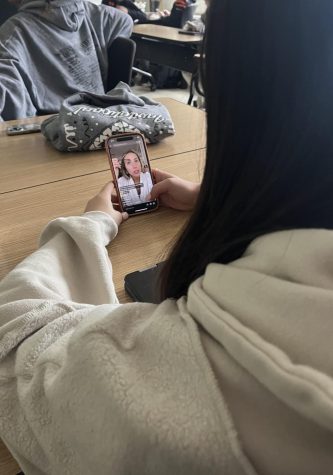Opinion: Mimicking influencers too closely diminishes individuality
January 23, 2023
 A simple scroll on the TikTok ‘for-you page’ would tell you all you need to know about the new ‘it-girl’. Whether it’s a ‘get ready with me’ video or someone analyzing her breakup with ex-boyfriend Tyler Wade, Alix Earle is the newest craze amongst young adults. For an influencer, she sure does her job well; after making videos of herself getting ready, the products Earle uses in her videos are almost immediately wiped out of stores. Influencers can do good by influencing the masses on social media, but how far is too far?
A simple scroll on the TikTok ‘for-you page’ would tell you all you need to know about the new ‘it-girl’. Whether it’s a ‘get ready with me’ video or someone analyzing her breakup with ex-boyfriend Tyler Wade, Alix Earle is the newest craze amongst young adults. For an influencer, she sure does her job well; after making videos of herself getting ready, the products Earle uses in her videos are almost immediately wiped out of stores. Influencers can do good by influencing the masses on social media, but how far is too far?
At just 22 years old, Earle is a college student at University of Miami, making millions from brand deals from companies big and small, and surpassing two million followers on TikTok ‘in just a month. According to Insider, Earle has caught the eye of so many young viewers due to her relatableness and comfort, making her viewers feel like she’s their ‘best friend’. It’s sought out as because Earle is conventionally attractive, followers feel as if they purchase the products and clothing she promotes, they too will be found more attractive or look similar to Earle.
Earle lives a seemingly expensive lifestyle, as do many influencers. When viewers try to mimic these lifestyles, it becomes problematic, as most consumers can’t afford a lavish lifestyle like their favorite influencers do. This leads people to turn to sites like DH Gate, Shein, and Amazon to find off-brand products that exactly mimic the items they see their favorite influencer using, for an affordable price; ‘dupes’ are a real issue, deeper than it may seem.
Companies promoting ‘dupes’ use ‘fast-fashion’ tactics to create products quickly, in large quantities, and for a very inexpensive cost. According to The Guardian, Chinese clothing manufacturers have changed the fast-fashion ‘game’ by selling directly to consumers online all over the world. “Equipped with English-language social media profiles, Amazon seller accounts, and access to nimble garment supply chains, they have fuelled the acceleration of trends and flooded closets everywhere with a wave of impossibly cheap clothes.”
Due to the low wages big corporations are able to pay their workers overseas, products are being manufactured for cheaper, allowing them to retail for less to consumers. Gucci, Dior, and Louis Vitton are just some of the luxury brands that get ripped off on fast-fashion sites, due to the demand for more luxury products, as seen on social media. Influencers like Earle are regularly seen in these luxury brands, influencing their viewers to go out and buy these products because they are high-end and desirable; although, the majority cannot afford luxury brands, so they turn to knock-off fast-fashion brands.
Aside from these issues, following an influencer’s lifestyle too closely diminishes individuality among the young viewers who watch them. By closely following the creators they see online, young audiences may try to create lifestyles that are not financially sound, or practical. Influencers are role models to the audiences that watch them, so of course viewers are going to want to be more like them. However, when viewers try to recreate the lifestyles they see online by purchasing every product an influencer promotes and following their lifestyle, it becomes an issue.
According to Linkedin, “A picture-perfect life that influencers portray on social media has a negative impact on teens. The unrealistic body figures, branded dresses, and makeup, advanced gadgets, and even what movies and series to watch, and what music to listen to, they watch them talk about and try to adapt it into their lives. All of it has an impact on the teens, in addition to the peer pressure which already exists in our society.”
Although influencers can’t control how closely their audiences follow them, they can be more mindful of what they post and how they target their audiences. Young viewers are always going to look up to the famous people showcased to them in the media, whether it’s big celebrities or influencers on TikTok. However, influencers can help promote individuality on their platforms to help influence their followers to be themselves. It’s reasonable to purchase some clothes or products you see promoted by influencers, but mimicking luxurious lifestyle choices that are out-of-reach, and turning to unsustainable fast-fashion ‘dupes’ is when mimicking social media stars becomes problematic and unethical.

























